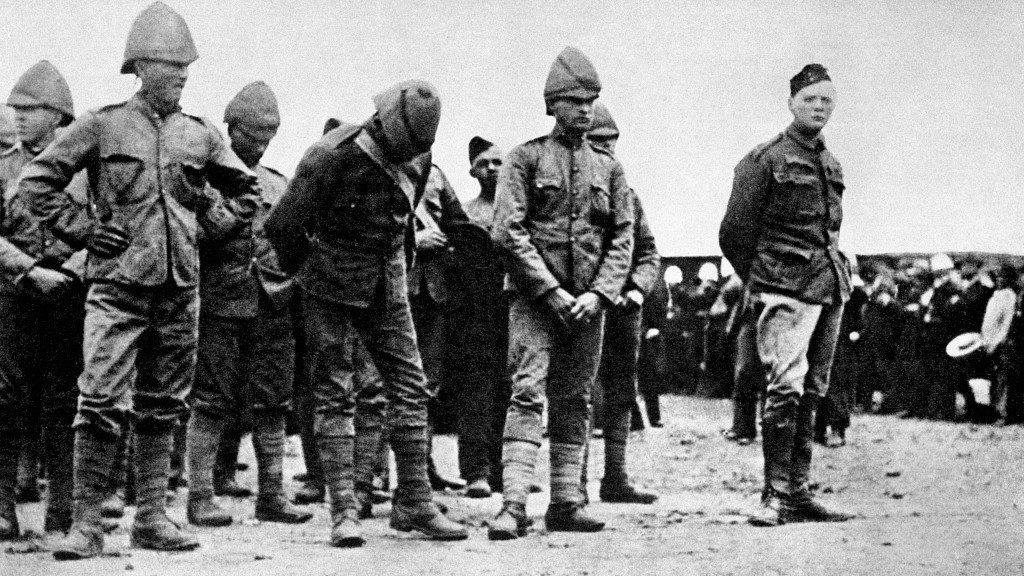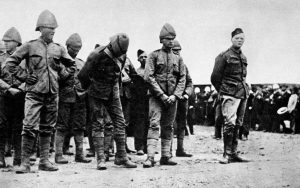
Blood, Toil, Tears and Sweat: Origins of a Famous Phrase
Though he gave permanent life to blood, toil, tears and sweat, Churchill’s best-remembered words did not originate with him. Similar expressions date very far back. (Excerpted from my essay for the Hillsdale College Churchill Project. To read the full article, click here.)
Quotations scholar Ralph Keyes writes:
Cicero and Livy wrote of “sweat and blood.” A 1611 John Donne poem included the lines “That ‘tis in vaine to dew, or mollifie / It with thy Teares, or Sweat, or Bloud.” More than two centuries later, Byron wrote, “Year after year they voted cent per cent / Blood, sweat, and tear-wrung millions—why?—for rent!” In his 1888 play Smith, Scottish poet-playwright John Davidson wrote of “Blood – sweats and tears, and haggard, homeless lives.” By 1939, a Lady Tegart reported in a magazine article that Jewish communal colonies in Palestine were “built on a foundation of blood, sweat, and tears”….Since this phrase was obviously familiar when Churchill gave his memorable speech the following year, even though he rearranged the words and added “toil” for good measure, our ears and our memory quickly returned them to the more familiar form.1
Blood, tears and (occasionally) toil
In the Boer War, imprisioned in Pretoria, he had a conversation with Mr. Grobelaar, the Boer Under-Secretary for Foreign Affairs. Churchill told Grobelaar that Britain would win: “…as I think Mr. Grobelaar knows, [it] is only a question of time and money expressed in terms of blood and tears.”2 In a 1900 article entitled, “Officers and Gentlemen” he used the phrase again:
…the knowledge gained at every manoeuvre must be used remorselessly to control the progress of mediocre men up the military ladder; to cast the bad ones down and help the good ones towards the top. It will all seem very sad and brutal in times of peace, but there will be less blood and tears when the next war comes.3
Thirty years later, in The World Crisis, he regarded the demise of European empires—a precursor, though he could not know it then, of the Second World War to come:
In the Parliaments of the Hapsburgs bands of excited deputies sat and howled at each other by the hour in rival languages, accompanying their choruses with the ceaseless slamming of desks which eventually by a sudden crescendo swelled into a cannonade. All gave rein to hatred; and all have paid for its indulgence with blood and tears.4
* * *
“Toil” was in the mix as early as 1932. Leaving New York after a lecture tour, Churchill was asked whether “a war between two or more powers is about to take fire.” He responded with one of his few strikingly bad predictions:
I do not believe that we shall see another great war in our time. War today is bare—bare of profit and stripped of all its glamour. The old pomp and circumstance are gone. War now is nothing now but toil, blood, death, squalor and lying propaganda.5
“Blood and tears” next appeared in when war was almost certain, in 1939″
Although the sufferings of the assaulted nations will be great in proportion as they have neglected their preparations, there is no reason to suppose that they will not emerge living and controlling from the conflict. With blood and tears they will bear forward faithfully and gloriously the ark which enshrines the title deeds of the good commonwealth of mankind.6
Toil, waste, sorrow and torment
An allied expression came in an article Churchill wrote during late stages of the Spanish Civil War, reprinted in his 1939 collection of articles, Step by Step:
Nearly all the countries and most of the people in every country desire above all things to prevent war. And no wonder, since except for a few handfuls of ferocious romanticists, or sordid would-be profiteers, war spells nothing but toil, waste, sorrow and torment to the vast mass of ordinary folk in every land. Why should this horror, which they dread and loathe, be forced upon them? How is it that they have not got the sense and the manhood to stop it?7
Blood, sweat and tears
Churchill added “sweat” in 1931, in the last volume of The World Crisis, as he described the devastating battles between the Russians and the Central Powers. His pages, he said, “record the toils, perils, sufferings and passions of millions of men. Their sweat, their tears, their blood bedewed the endless plain.”8 Another piece on war in Spain carried the expanded phrase:
But at length regular armies come into the field. Discipline and organisation grip in earnest both sides. They march, manoeuvre, advance, retreat, with all the valour common to the leading races of mankind. But here are new structures of national life erected upon blood, sweat and tears, which are not dissimilar and therefore capable of being united. What milestone of advantage can be gained by going farther? Now is the time to stop.9
Blood, toil, tears and sweat
Finally, on 13 May 1940, all four famous words came together in Churchill’s inspiring first speech as Prime Minister: “I have nothing to offer but blood, toil, tears and sweat.” Clearly he had considered and arranged the words for maximum impact. His postwar recording of the speech comes down very hard on the“sweat.”10 The response to those words was electric and gratifying, though Churchill was had mixed thoughts about it: “One would think one had brought some great benefit to them, instead of the blood and tears, the toil and sweat, which is all I have ever promised.”11
* * *
An indefatigable reviser, like most good writers, Churchill created an addendum to his famous phrase a year after he first used it, at a grim time. Rommel was rebounding in North Africa, Nazi submarines were taking a deadly toll on the Atlantic, the Blitz continued, and Britain was still alone. Churchill recognized the perils, but ended on a high note:
I have never promised anything or offered anything but blood, tears, toil, and sweat, to which I will now add our fair share of mistakes, shortcomings and disappointments….When I look back on the perils which have been overcome, upon the great mountain waves through which the gallant ship has driven, when I remember all that has gone wrong, and remember also all that has gone right, I feel sure we have no need to fear the tempest. Let it roar, and let it rage. We shall come through.12
A more hopeful evaluation of the cost of the war to date was offered just before the attack on Pearl Harbor:
I promised eighteen months ago “blood, tears, toil and sweat.” There has not yet been, thank God, so much blood as was expected. There have not been so many tears. But here we have another instalment of toil and sweat, of inconvenience and self-denial, which I am sure will be accepted with cheerful and proud alacrity by all parties and all classes in the British nation.13
Votes of no confidence
Although Russia and America had joined Britain in the battle by the end of 1941, the situation was bleaker than ever when Churchill called for a vote of confidence in January 1942. He handily won, 464 to one. Winding up for the Government, he reminded the House that nothing had changed: “I stand by my original programme, blood, toil, tears and sweat, which is all I have ever offered, to which I added, five months later, many shortcomings, mistakes and disappointments.”14
A more contentious vote of no confidence was faced down in July. After Tobruk had fallen to Rommel, dissident MPs tabled the motion, but Churchill defeated that one, too, 475 to 25, falling back on his old prescription and giving it a new twist:
I have not made any arrogant, confident, boasting predictions at all. On the contrary, I have struck hard to my “blood, toil, tears and sweat,” to which I have added muddle and mismanagement, and that, to some extent, I must admit, is what you have got out of it.15
Hinge of fate
Finally in the autumn of 1942, the victory at Alamein turned the tide of the war for Britain. It marked, wrote Churchill, “the turning of ‘the Hinge of Fate.’ It may almost be said, ‘Before Alamein we never had a victory. After Alamein we never had a defeat.’”16 Doubtless he felt it right to reiterate the original phraseology:
I have never promised anything but blood, tears, toil and sweat. Now, however, we have a new experience. We have victory—a remarkable and definite victory. The bright gleam has caught the helmets of our soldiers, and warmed and cheered all our hearts.17
Endnotes
1 Ralph Keyes, The Quote Verifier (New York: St. Martin’s, 2006), 15.
2 Winston S. Churchill (hereinafter “WSC,” London to Ladysmith via Pretoria (London: Longmans, 1900), 166.
3 WSC, “Officers and Gentlemen,” The Saturday Evening Post, 29 December 1900, reprinted in The Collected Essays of Sir Winston Churchill(London: Library of Imperial History, 1975, 4 vols., I, 53.
4 WSC, The World Crisis, vol. V, The Eastern Front (London: Thornton Butterworth, 1931), 21.
5 Martin Gilbert, Winston Churchill: The Wilderness Years (Boston: Houghton Mifflin, 1982), 45. From a radio interview in Boston on 10 March 1932. It is most unlikely that he would have made the same prediction a few months later. By May 1932 the National Socialists had become the largest single party in Germany.
6 WSC, “Will There Be War in Europe—and When?,” News of the World, 4 June 1939. Also published slightly abridged as “War, Now or Never,” Colliers, 3 June 1939 and reprinted in full in Collected Essays I, 443.
7 WSC, “How to Stop War,” Evening Standard, 12 June 1936, reprinted in Step by Step 1936-1939 (London: Thornton Butterworth, 1939), 25.
8 WSC, The Eastern Front, 17.
9 WSC, “Can Franco Restore Unity and Strength to Spain?,” Daily Telegraph, 23 February 1939; reprinted as “Hope in Spain,” in Step by Step, 319.
* * *
10 Winston S. Churchill: His Memoirs and His Speeches 1918-1945, New York: Decca Records (12 LPs), 1965.
11 WSC, House of Commons, 8 October 1940.
12 WSC, House of Commons, 7 May 1941.
13 WSC, House of Commons, 2 December 1941.
14 WSC, House of Commons, 27 January 1942.
15 WSC, House of Commons, 1 July 1942.
16 WSC, The Hinge of Fate (London: Cassell, 1950), 541.
17 WSC, Lord Mayor’s Day Luncheon, Mansion House, London, 9 November 1942, in The End of the Beginning (London: Cassell, 1943), 265-66.
See also: “Churchill on the Broadcast.”







